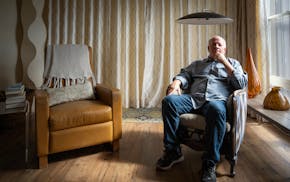Someone from the school had called to tell him that his son was in trouble.
On his walk to the school, Melvin found himself getting angrier and angrier.
His internal dialogue was angry, too. "I don't care who is looking," Melvin told himself. "I'm going to beat that boy. I'm going to beat him, and beat him and beat him."
But he didn't.
Melvin, who didn't want his last name used, had been attending a support group for fathers offered through Catholic Charities, and instead of letting his anger drive him, he called his counselors.
"They talked me down," said Melvin, who was only doing what he had been taught.
"I just copied my parents," Melvin said. "I was raised up on whoopins."
They didn't do much good. Melvin still went to prison three times, including for aggravated robbery.
He's been going to the fathers' group for several years, as well as meeting privately with a therapist. On Tuesday, his group met and talked for an hour and a half about the Adrian Peterson case.
Most of the group had experienced or perpetrated abuse before, "so we understood why he was whooping a child, but we thought he went too far. I think it was unanimous that he went too far with a 4-year-old."
Before a friend told him about the Catholic Charities program, Melvin said his philosophy of punishment was "whoop 'em, whoop 'em, whoop 'em," even though he knew it didn't help him growing up.
"All it did [when he was struck] was make me angrier," said Melvin. And after he hit his children, "it actually made me feel bad. It made me feel like an ass."
Keith Kozerski, director of children's services at Catholic Charities, said people like Melvin come to their programs because "they experienced a parenting style they don't want to replicate themselves. In our society there is very little formal education that teaches you about raising a child."
Nearly every day, counselors at Catholic Charities programs hear parents say that they are simply doing what their parents did to them, "so I'm not surprised when I hear it come out of anyone's mouth."
Before it's too late
On a sunny morning this week a half-dozen young children, all appearing to be about 5 years old, pushed through the security doors, ragged from an outing to the park. Two kids slumped over in a giant stroller, fast asleep from exercise and fresh air.
A small girl with pigtails held up two wilted weeds she had picked and proclaimed them dandelion "sisters."
It had been a week in which everyone had an opinion on how to raise children. Here, at the Greater Minneapolis Crisis Nursery, the topic is real, every day. The kids here are lucky, their parents called for help before it was too late.
This is where parents who are in some sort of turmoil — financial, emotional or physical — come to find help and respite. They might be afraid that, under the pressures of their lives, they might harm their children.
Parents who physically hurt their kids end up in jail and in court, their kids placed with relatives or in protective custody. The crisis nursery is the place for the kids whose parents had the presence, and courage, to call for help.
About 90 percent of the clients here are poor, though all incomes are welcome. All share some characteristics, especially some kind of isolation. And a middle- or higher-income parent can be just as isolated as a poor person, counselors say, by pride and fear.
"They think that 'we're not those people,' " said Molly Kenney, Family Services Director.
Kenney said successful people, even if they have the resources, are not likely to reach out for help raising a child because then they have to acknowledge they aren't successful at something.
Catholic Charities' Kozerski added that an ER doctor or pediatrician is less likely to report educated, upper-income parents for abuse because of stereotypes that abuse is done by the poor.
Kenney said we've only been recognizing child abuse since the 1970s. Even at Crisis Nursery, counselors seven years ago asked clients about all kinds of issues, but not about their parenting skills.
Now, the first thing counselors at the nursery do is say, "We understand how much courage it took to call us," Kenney said. Then they ask them: "What is it like to be the parent of this child?"
What safety looks like
Mary Pat Lee, executive director of the nursery, said if there is an "upside" to the Peterson case, it's to "get people to look at trying to get parents to be educated." She doesn't want the issue to go away with the next game.
All the social services people I interviewed believe that Peterson can eventually play a huge part in that discussion. Peterson has said he already has started seeing a psychologist about his behavior, and everyone agrees that's good.
Families who come to the nursery learn stress-reduction and coping skills, and how to discipline their kids without violence.
"A lot of people don't even know what safety looks like for their family," said Kamyala Howard, children's services director for Crisis Nursery.
Melvin said he's learned what it looks like. When his 10-year-old misbehaves, he makes him stay inside or takes away his video game.
"I actually think he'd rather be spanked," said Melvin. "But one thing I learned is that hitting just tells him that hitting is the way to solve problems.
"That's the last thing I want to teach him."
jtevlin@startribune.com • 612-673-1702
Follow Jon on Twitter: @jontevlin

Depressed after his wife's death, this Minneapolis man turned to ketamine therapy for help

Tevlin: 'Against all odds, I survived a career in journalism'



